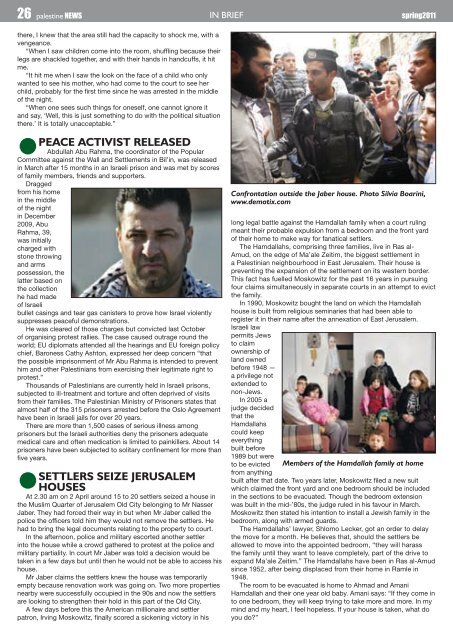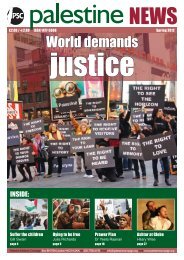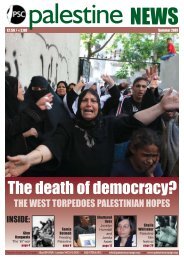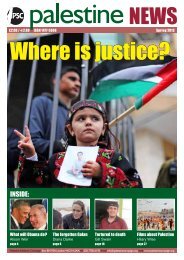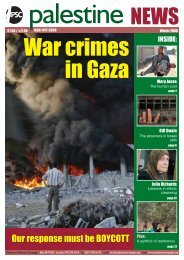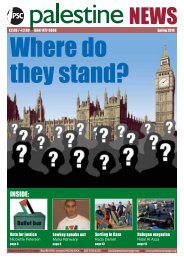InsIDe: - Palestine Solidarity Campaign
InsIDe: - Palestine Solidarity Campaign
InsIDe: - Palestine Solidarity Campaign
Create successful ePaper yourself
Turn your PDF publications into a flip-book with our unique Google optimized e-Paper software.
26 palestine news in briefspring2011there, I knew that the area still had the capacity to shock me, with avengeance.“When I saw children come into the room, shuffling because theirlegs are shackled together, and with their hands in handcuffs, it hitme.“It hit me when I saw the look on the face of a child who onlywanted to see his mother, who had come to the court to see herchild, probably for the first time since he was arrested in the middleof the night.“When one sees such things for oneself, one cannot ignore itand say, ‘Well, this is just something to do with the political situationthere.’ It is totally unacceptable.”•Peace activist releasedAbdullah Abu Rahma, the coordinator of the PopularCommittee against the Wall and Settlements in Bil’in, was releasedin March after 15 months in an Israeli prison and was met by scoresof family members, friends and supporters.Draggedfrom his homein the middleof the nightin December2009, AbuRahma, 39,was initiallycharged withstone throwingand armspossession, thelatter based onthe collectionhe had madeof Israelibullet casings and tear gas canisters to prove how Israel violentlysuppresses peaceful demonstrations.He was cleared of those charges but convicted last Octoberof organising protest rallies. The case caused outrage round theworld; EU diplomats attended all the hearings and EU foreign policychief, Baroness Cathy Ashton, expressed her deep concern “thatthe possible imprisonment of Mr Abu Rahma is intended to preventhim and other Palestinians from exercising their legitimate right toprotest.”Thousands of Palestinians are currently held in Israeli prisons,subjected to ill-treatment and torture and often deprived of visitsfrom their families. The Palestinian Ministry of Prisoners states thatalmost half of the 315 prisoners arrested before the Oslo Agreementhave been in Israeli jails for over 20 years.There are more than 1,500 cases of serious illness amongprisoners but the Israeli authorities deny the prisoners adequatemedical care and often medication is limited to painkillers. About 14prisoners have been subjected to solitary confinement for more thanfive years.•Settlers seize JerusalemhousesAt 2.30 am on 2 April around 15 to 20 settlers seized a house inthe Muslim Quarter of Jerusalem Old City belonging to Mr NasserJaber. They had forced their way in but when Mr Jaber called thepolice the officers told him they would not remove the settlers. Hehad to bring the legal documents relating to the property to court.In the afternoon, police and military escorted another settlerinto the house while a crowd gathered to protest at the police andmilitary partiality. In court Mr Jaber was told a decision would betaken in a few days but until then he would not be able to access hishouse.Mr Jaber claims the settlers knew the house was temporarilyempty because renovation work was going on. Two more propertiesnearby were successfully occupied in the 90s and now the settlersare looking to strengthen their hold in this part of the Old City.A few days before this the American millionaire and settlerpatron, Irving Moskowitz, finally scored a sickening victory in hisConfrontation outside the Jaber house. Photo Silvia Boarini,www.demotix.comlong legal battle against the Hamdallah family when a court rulingmeant their probable expulsion from a bedroom and the front yardof their home to make way for fanatical settlers.The Hamdallahs, comprising three families, live in Ras al-Amud, on the edge of Ma’ale Zeitim, the biggest settlement ina Palestinian neighbourhood in East Jerusalem. Their house ispreventing the expansion of the settlement on its western border.This fact has fuelled Moskowitz for the past 16 years in pursuingfour claims simultaneously in separate courts in an attempt to evictthe family.In 1990, Moskowitz bought the land on which the Hamdallahhouse is built from religious seminaries that had been able toregister it in their name after the annexation of East Jerusalem.Israeli lawpermits Jewsto claimownership ofland ownedbefore 1948 —a privilege notextended tonon-Jews.In 2005 ajudge decidedthat theHamdallahscould keepeverythingbuilt before1989 but wereto be evicted Members of the Hamdallah family at homefrom anythingbuilt after that date. Two years later, Moskowitz filed a new suitwhich claimed the front yard and one bedroom should be includedin the sections to be evacuated. Though the bedroom extensionwas built in the mid-’80s, the judge ruled in his favour in March.Moskowitz then stated his intention to install a Jewish family in thebedroom, along with armed guards.The Hamdallahs’ lawyer, Shlomo Lecker, got an order to delaythe move for a month. He believes that, should the settlers beallowed to move into the appointed bedroom, “they will harassthe family until they want to leave completely, part of the drive toexpand Ma’ale Zeitim.” The Hamdallahs have been in Ras al-Amudsince 1952, after being displaced from their home in Ramle in1948.The room to be evacuated is home to Ahmad and AmaniHamdallah and their one year old baby. Amani says: “If they come into one bedroom, they will keep trying to take more and more. In mymind and my heart, I feel hopeless. If your house is taken, what doyou do?”


